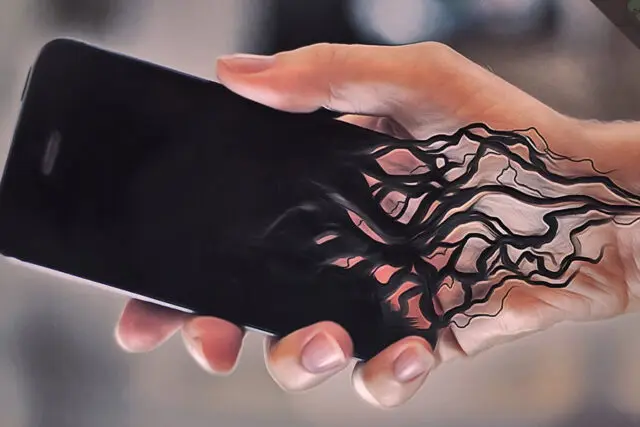In 2019, the World Health Organization (WHO) released that, anxiety is the most important psychiatric disorder in the world, with which more than 264 million people live with. Also, the organization reported during the COVID-19 pandemic, anxiety increased by 25%.
Today, what pandemic could be generating more and more anxiety in the population, the technological one?
You may wonder why we emphasize technology which, of course, is inevitable to control in these times of constant evolution according to data collected in 2022 by Statista, the number of smartphone users in the world amounted to 6,567 million people with a view to an increase that is equivalent to more than 85% of the global population.

Are the above figures good or bad?
In today’s world, it may seem inevitable to stop using the cell phone, when even making a bank transaction can be done through an app and the most constant, being able to order your favorite food to be delivered to your home. But every excessive use has its consequences.
The extreme use of the cell phone has caused a dependency, a fear that today is called nomophobia.
Nomophobia is the fear of being without a cell phone, as well as the anxiety experienced when not having access to it. This term was first coined in 2008 by British researcher David A. Lewis, who defined it as “no-mobile phobia”.

This phobia affects people of all ages worldwide, but especially young people. Studies and figures vary depending on the country and the sample used, but it is estimated that between 50% and 70% of the world’s population suffers from some degree of nomophobia.
A study conducted in 2017 by digital security firm Norton revealed that 64% of Spanish young people between the ages of 16 and 24 suffer from nomophobia. Another study conducted by Mexico’s National Institute of Statistics in the same year found that 40% of Mexicans presented high levels of cell phone dependence.
In general, nomophobia is associated with mental health problems, such as anxiety, stress, depression, and lack of concentration. It can also affect interpersonal relationships and productivity at work or school.

The results of our surveys in TCRN
Through our accounts on different social networks such as Facebook, Instagram, and X old Twitter, we publish surveys with the questions: how long can you go without using your cell phone? and can you go without using a cell phone? with answer options: yes, no, 1 day, a week, or a month.
According to the results obtained on Instagram, 57% of voters can spend time without a cell phone and 43% cannot.
The results of X, reflect that 67% of people can spend 1 day without using a cell phone, 27% 1 week, and 7% 1 month. In the results of Facebook, the option 1 day had the highest result and then the option 1 week.
In other words, most people can go a maximum of one day without using a cell phone.
Experts’ opinion and advice
Given the results of the surveys and the anxiety with which part of the world population lives, we wanted to talk to two psychologists Jimena Caballero and Mahuampi Guzmán.
Symptoms or consequences in humans due to Nomophobia
Psychologists agreed on the symptoms in a person with nomophobia, many of them linked to those that generate anxiety crises such as headache, stomach pain, fears and irrational thoughts, obsessive thoughts and emotions, compulsive behavior, as well as the search for acceptance and approval.

“For example, irrational thoughts can be generated referring to the fact that since we are not connected to the cell phone and we are not giving immediate information, we can lose things: people, jobs, and opportunities, which are still there, but the thoughts make it impossible to believe and notice in the here, in the now,” Caballero pointed out.
What to do in the presence of Nomophobia in our lives?
Jimena and Mahuampi highlighted some psychological suggestions for healing nomophobia:

The main thing is to start allowing ourselves spaces where we disconnect from the phone, if we are too addicted it can be small spaces: on weekends or a Sunday, at mealtimes with the family, a couple of hours before going to sleep, that is vital, the world is going to end simply because we are giving ourselves some space.

We must learn to value the environment, not the screens. We must take our eyes off the phone and understand how wonderful life is, appreciate the sky, the plants, the human beings who surround us, the little things that make us human, and that sometimes we miss because we are in the virtual world.
Distorted thinking should be replaced by adequate thinking to reduce anxiety.
To prevent this, you should see a mental health specialist, with whom you can coordinate personal meetings regularly. When we are in a meeting, avoid using the telephone and finally, establish schedules for the use of the cell phone, respecting meal and sleep schedules.
To permit ourselves, that is, to express to a person “Look, I can’t answer you because I don’t have a cell phone, or because yesterday I didn’t want to see the cell phone because I decided to take a little time for myself”, is to know that this is good and healthy for oneself, not to demand of oneself to always be attentive to others, but to value our own space and the environment in which we live, to value is fundamental.
Among other cognitive-behavioral techniques…
Now you know, if you consider that nomophobia is or is not present in your life, follow the tips to heal or prevent this disorder.
If you want to know more about the psychologists you can follow them on their Instagram accounts: @jimena.caballerocr and @psicoconsultamg.

